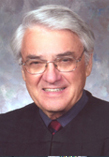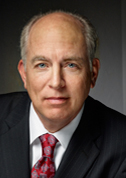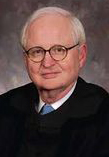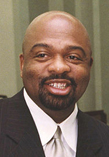© 2016 The Texas Lawbook.
By Mark Curriden
(Dec. 12) – A lawyer for Trinity Industries told a three-judge panel of the U.S. Court of Appeals for the Fifth Circuit that a record-smashing $663 million judgment against the Dallas industrial supply business should be reversed because its failure to report to federal officials changes it made to its highway guardrail was inadvertent, minor and immaterial.
“You say they are minor and they say they are killer,” Judge Patrick Higginbotham shot back. “I mean, come on.”

Independent legal experts believed that Trinity’s position would rule the day with the country’s most conservative, pro-business federal appeals court. After all, Fifth Circuit jurists have a history of being anti-big jury verdicts and opposed to expanding litigation rights to plaintiffs.
Then came 55 minutes last Wednesday when the judges hearing oral arguments at the John Minor Wisdom Courthouse in New Orleans became more of a buzz saw than a shield for Trinity.
Lawyers for Trinity and whistleblowing plaintiff Joshua Harmon walked into the courtroom at 600 Camp Street prepared to spar over the lofty philosophical and constitutional issues at the heart of the largest False Claims Act judgment in U.S. history.
But seconds into oral argument, the judges turned the case upside down by making it clear that they were more interested in the specificities of guardrail safety tests and other precise details regarding the evidence presented at trial than the scholarly debate over the level of deference executive branch decision-making should receive in FCA litigation.
Legal experts who read the briefs filed with the Fifth Circuit predicted a near slam-dunk win for the Dallas-based global industrial supply business. But those same analysts say that, based solely on those 55 minutes of questions and comments by the judicial panel, an affirmation of the jury verdict favoring the plaintiff is now more likely.

Tom Melsheimer, a principle at Fish & Richardson in Dallas who has handled several high-profile FCA cases, said the three-judge panel “was very engaged in the nuances of the factual record,” which appeared to catch the lawyers off-guard.
“It was clearly what appellate lawyers call a ‘hot panel,’” Melsheimer said.

Oral argument in the Trinity litigation also demonstrated that facts actually matter, even in cases where broad questions of law are raised.
And while questions and comments from appellate judges do not always indicate how they will eventually rule, the Trinity case raises the age-old dispute: How much do oral arguments really matter?
This litigation started in 2012 when Harmon, a former competitor, sued Trinity under the FCA, a 153-year-old law that allows whistleblowers to sue businesses that defraud the U.S. government. The lawsuit claimed that the company shrank its popular ET-Plus highway guardrail system in 2005 from five inches wide to four inches in order to save $50,000 a year in costs.
Harmon’s lawyers argue that Trinity failed to inform the Federal Highway Administration about the changes, as required by law. Those changes, Harmon claims, “had a devastating impact” on the guardrail’s performance and led to car accident victims being killed or maimed.
The East Texas jury ruled against Trinity in 2014. Months later, U.S. District Judge Rodney Gilstrap slapped the company with a $663 million judgment – the largest in the history of the FCA – and opened the door to a flood of lawsuits that seek billions of dollars in damages against the company.
“We do not believe that we did anything wrong,” Trinity Chief Legal Officer Theis Rice told The Texas Lawbook in an interview earlier this year. “We do not believe that this litigation should have ever made it to trial because we think it should have been dismissed by the court.
“We decided that it was in the best interest of the company to fight and not to settle,” Rice said.
Trinity’s primary focus for the past two years has been to persuade the Fifth Circuit to reverse the trial court’s verdict and end the case.
Indeed, the company’s lawyers had damn good reason to believe the Fifth Circuit would take their side.
In October 2014, just days before Harmon v. Trinity was set to go to trial, the defendant filed a mandamus petition asking the Fifth Circuit to intervene and put an end to the case.
A different three-judge panel rejected Trinity’s request, but the court took the extraordinary step of expressing its concern that the trial court had failed to “issue a reasoned ruling” regarding the “defendant’s motion for judgment as a matter of law.” The Fifth Circuit panel stated that “a strong argument can be made that the defendant’s actions were neither material nor were any false claims based on false certifications presented to the government.”
Trinity’s hope for victory seemed to increase when one of the three judges who issued the 2014 order – the conservative, Republican-appointed Judge Higginbotham – was named to the panel handling the company’s appeal.
Judge Higginbotham, however, quickly demonstrated that his opinion pretrial did not limit his examination of the case post-trial.
“Anyone who knows Judge Higginbotham knows he has a great respect for the role of juries and the decisions juries make,” Barnett said. “Remember, Pat Higginbotham was a trial lawyer before he went on the bench and he was a trial judge before he joined the appellate court.”
Gibson, Dunn & Crutcher partner James Ho, an appellate law specialist representing Trinity, opened oral arguments by highlighting his client’s primary position.

Only 44 seconds into oral arguments, Judge Higginbotham spoke up.
“Why did you not test this product before trial?” asked Higginbotham, who is widely regarded as one of the smartest legal minds on the federal bench.
“The engineers indicated to us that there was no need to do this under the rules,” Ho replied.
Higginbotham said he actually read the trial transcript because he was curious about a “pattern of failures” involving the four-inch guardrails.
Ho responded that the failures the court referred to regarded photos of crash sites taken by the plaintiff, which he said could not be reliably used as evidence of non-compliance. Such photos and expert testimony based on them were prejudicial and not probative.
“The arguments you are making are not necessarily a winning argument,” responded Judge E. Grady Jolly. “These are arguments that were made to the jury. We have to get into the weeds to understand the arguments you are making, but [the jury] has already been down in the weeds.”

Ho said the courts have ruled that statements cannot be material if government knew about it and still approved the product.
Judge Jolly pointed out that Harmon’s lawyers contend that the highway administration did not have the full facts at the time they approved the ET-Plus.
“Your main argument, which is a persuasive argument if it’s supported by the facts, is that the government approved this after these alleged misrepresentations occurred,” Judge Jolly said. “[The plaintiff’s lawyers] respond that the highway administration did not have the full facts at the times that they approved … that you had concealed some of the facts.”
Ho said it is “demonstrably untrue” that the FHWA did not know about all of the changes. He said Harmon told the government about his allegations and the FHWA still approved the ET-Plus. Ho pointed to case law stating that there “is no materiality when the government approves.”
“My suggestion to you is that materiality and causation in this case are very close companions, if not collapsible into one,” Judge Higginbotham told Ho. “If it is the case that this particular product was causing these catastrophic injuries, then it is very difficult to maintain the argument or to quarrel with the judgment of the jury as to materiality.”
“Was there testimony that these design failures caused accidents?” Judge Jolly asked Ho. “Is there scientific evidence that the design changes made without the immediate knowledge of the FHWA caused the accidents that were described in the testimony?”
Ho responded that there “is the allegation, and there is a dispute, I grant you that.” He again implored the panel “to elevate above this scientific dispute.”
“I want to know where the fraud is. How was the government defrauded?” Judge Jolly said. “If the evidence shows that the accidents that were introduced in this case were caused by the changes that were made without the approval of the Federal Highway Administration, then that shows you that the government may have been defrauded.
“The [plaintiff’s] experts … testified that the changes you made without the approval of FHWA was a cause of the accidents,” the judge stated. “Yes or no?”
“Yes, that is their argument, but we vociferously disagree,” Ho answered.
“The jury heard all the evidence, heard your experts and they heard their experts. And they decided against you,” Judge Jolly told Ho.
Ho argued that the questions by the judges would be “more interesting” if this was a products liability case – not an FCA dispute.
Throughout oral arguments, Ho tried time and time again to get the judges to focus on broad legal principles.
“Your honors, there’s been a lot of talk about facts and the evidence,” Ho told the judges near the end of his argument. “I beg of you to allow me to talk about the law.”
 George Carpinello, a partner at New York’s Bois Schiller & Flexner who represents Harmon, told the Fifth Circuit that neither Trinity nor the FHWA “bothered to examined any of the accidents” that involved Trinity’s guardrails, but that the plaintiff’s experts did study the crashes.
George Carpinello, a partner at New York’s Bois Schiller & Flexner who represents Harmon, told the Fifth Circuit that neither Trinity nor the FHWA “bothered to examined any of the accidents” that involved Trinity’s guardrails, but that the plaintiff’s experts did study the crashes.“Our expert testified in detail of the changes, how each change affected how the changes ET Plus worked, how the head would lock up because they reduced the vertical size and reduced the exit gap,” Carpinello said. “We actually had two of them in the courtroom and you could see that you could stick your hand in one of them and you couldn’t stick your hand in the other one.”
Carpinello said that the experts testified that the changes by Trinity caused the problems.
“Trinity admitted at trial that the states would not have bought it without the government’s certification,” he said. “The FHWA did not have a slew of facts that the jury had in this case … The FHWA issued a finding that what Trinity did [in not disclosing the changes] was inadvertent. They said it was inadvertent because that it was [what] Trinity told them.
“The law is on our side,” he told the judges.
“There’s some law on your side and some against you,” Judge Jolly shot back.
Judge Jolly asked equally tough questions of Carpinello. The judge noted that two federal government task forces reviewed the ET-Plus, conducted additional safety tests and then announced that the guardrails were still approved for use – evidence that the judge said “indicates that the government was not defrauded.
“If the government is not complaining about it, and the government is willing to accept it, then any kind of change was immaterial,” Judge Jolly stated.
“Disagree, your honor,” Carpinello answered.
“I know you disagree, but it makes sense to me and there’s a lot of law that supports it,” Judge Jolly responded.
The Fifth Circuit has multiple options: affirm the verdict and the judgment; reverse the verdict and end the case; send the case back to the trial court for a new trial; or affirm the jury’s verdict but reduce the judgment.

But Melsheimer offers a warning to those who think Trinity’s legal fate is sealed.
“It’s perilous to read too much into the substance or number of the questions directed to either side,” Melsheimer said. “The opinion will be important either way it comes out and may not be the last word in the case in any event.”
© 2016 The Texas Lawbook. Content of The Texas Lawbook is controlled and protected by specific licensing agreements with our subscribers and under federal copyright laws. Any distribution of this content without the consent of The Texas Lawbook is prohibited.
If you see any inaccuracy in any article in The Texas Lawbook, please contact us. Our goal is content that is 100% true and accurate. Thank you.
